
foaloce/Adobe Stock
Cats are famous for their love of climbing. Outdoor cats are known for their penchant of climbing trees, while indoor cats enjoy scaling “cat trees” provided by their owners. But why is climbing such a favorite pastime of our feline friends?
To understand cats’ proclivity for climbing, you have to look at their natural history.
As with all domestic animals, the house cat had wild ancestors who had to work hard to survive in nature. Although we think of cats as predators, they can also fall prey to larger hunters. During the time of our cats’ ancestors, climbing trees was a way of staying safe from ground-dwelling predators. Climbing also gave early cats a way keep the larger prey they had caught hidden from other animals who might try to steal it. These cats could stash their catch in trees, much like modern leopards do today.

Mi.Ti/Adobe Stock
Fast forward to today, and Felis catus—the domestic cat—still loves to climb. While escaping from predators and hiding their food is less of an issue for well-cared-for pet cats, the desire to climb is still strong. Cats feel more secure when they are high up, and are more comfortable sharing their territory with other cats when they can retreat to elevated places. They are also built for climbing, with their extremely flexible bodies and retractable claws.
It’s important to give your cat opportunities to appropriately express her innate desire to climb. This is especially true if she’s an indoor cat. Without access to trees, she might be inclined to climb up your drapes or up the side of your couch. A well-made cat tree can help her channel her urges to climb—and will give you hours of entertainment as you watch her scramble up it when she’s feeling energetic.

When choosing a cat tree, pick the tallest one you can afford. The higher up your cat can go, the better. Commercial cat trees feature platforms and cubbyholes of various styles and shapes. Select the one you think your cat would most enjoy. Or, try making your own. Just be sure it’s sturdy and doesn’t wobble when your cat jumps on it.
It’s important to keep your cat’s age and health in mind when providing a safe climbing place. Young kittens may be intimidated by a larger cat tree, so you might want to start with a smaller one if your cat is just a baby.
Older cats particularly enjoy sleeping in high places but might have some trouble climbing like they did when they were young. Consider putting your cat tree near a table or dresser so your senior cat can get to that higher elevation more easily.
About the Author: Audrey Pavia is an award-winning freelance writer and author of “The Labrador Retriever Handbook.” She is a former staff editor of Dog Fancy, Dog World and The AKC Gazette magazines. To learn more about her work, visit www.audreypavia.com and hollywoodhoofbeats.net/





